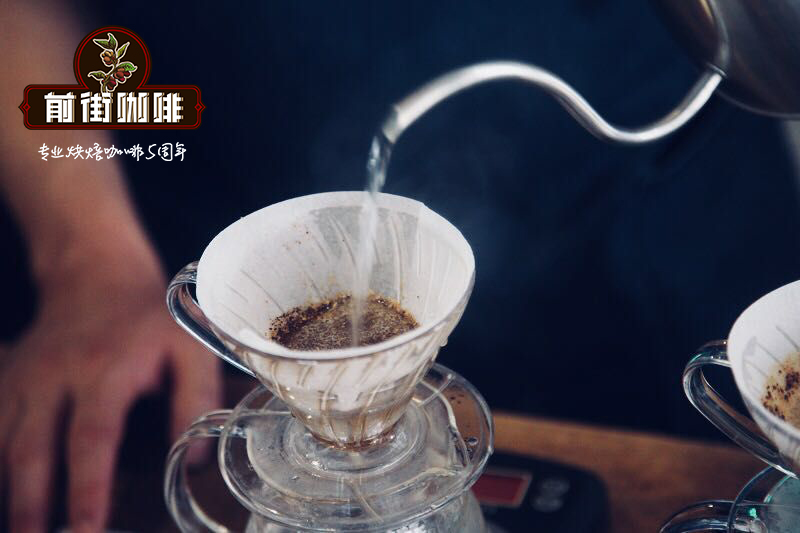What is the reason for the expansion of coffee? Does stuffy steaming not expand mean that the coffee is not fresh?

It is believed that you will see a phenomenon when you have made coffee by hand or when you have seen others make coffee, that is, when the water begins to come into contact with coffee powder, there will be bubbles coming out, and the coffee powder will swell. It is also possible that the size of the foam coming out of each brewing time, how much, the degree of expansion of coffee powder is often different.
What on earth are these bubbles?
In fact, the gas in the bubble is the carbon dioxide produced when roasting coffee beans, and the outer membrane of the bubble is formed by coffee proteins or polysaccharides (the same fraction of bubbles covered by Italian espresso). Going back to the question just now, the extent of the coffee foam is actually caused by different ways of releasing carbon dioxide.
Is it true that the more bubbles, the better the coffee beans?
Freshly baked coffee beans are rich in carbon dioxide. If they are immediately ground into powder and poured into hot water, a large number of bubbles will be produced. These bubbles stop the extraction of coffee, not that the beans are bad. So we should take a correct look at your problem, and if you make coffee at this time, it will taste lighter than usual. Then the freshly ground coffee beans are usually put for one night before use.
Is it because the coffee powder is not expanding, that is, the coffee is not fresh?
In fact, this is also a big misunderstanding, whether there are bubbles and the degree of expansion of coffee powder is related to the amount of carbon dioxide in coffee powder, of course, if it does not expand much, it will be thought to be because coffee powder is not fresh. Indeed, with the passage of time after baking, there will be less and less carbon dioxide in coffee beans. However, the reason why coffee powder does not expand easily may also be due to the addition of a deoxidizer that absorbs carbon dioxide, or the use of coffee powder with large particles and slowly pouring into hot water, as well as water temperature permitting. So we can't generalize.
Generally speaking, deep-roasted coffee is more likely to bubble.
Because in the roasting process of coffee beans, coffee beans will begin to change chemically. after the occurrence of one explosion and two explosions, the fiber gaps in coffee beans will become larger and bigger, and some of them will even break, so deep-roasted coffee is more likely to bubble when brewing. And the time of bubbling is shorter than that of shallow roasting. In series, the light-roasted coffee bean fibers touch more closely, the gap will be very small, and the contact surface with water is smaller than deep-baking, so you will see that the light-roasted coffee powder will soak slowly and last for a long time in the process of hand-brewing coffee stewing.
Important Notice :
前街咖啡 FrontStreet Coffee has moved to new addredd:
FrontStreet Coffee Address: 315,Donghua East Road,GuangZhou
Tel:020 38364473
- Prev

How should I make the hanging-ear coffee? can I soak it? Can hanging-ear coffee also wash out the taste of hand-brewed coffee?
Hang-ear coffee is to grind the coffee into coffee powder and put it in a sealed filter bag. The reason why it is called hanging-ear coffee is that in the process of brewing, small pieces of paper (small ears) on both sides of the filter bag need to be opened and hung on the cup for extraction.
- Next

Can drinking black coffee really help you lose weight? How much coffee is appropriate for a day? Will you be hungry if you drink coffee?
Can drinking black coffee really help you lose weight? How many cups of coffee are appropriate for a day? Will you be hungry if you drink coffee? When the weather is cold, many people will want to drink a hot drink to keep the body warm! But does the drink you drink really protect you from the cold? Do you often wonder why it is still chilly after drinking a hot drink? It is often said that hot cocoa and hot milk tea are surprisingly high in calories.
Related
- Beginners will see the "Coffee pull flower" guide!
- What is the difference between ice blog purified milk and ordinary milk coffee?
- Why is the Philippines the largest producer of crops in Liberia?
- For coffee extraction, should the fine powder be retained?
- How does extracted espresso fill pressed powder? How much strength does it take to press the powder?
- How to make jasmine cold extract coffee? Is the jasmine + latte good?
- Will this little toy really make the coffee taste better? How does Lily Drip affect coffee extraction?
- Will the action of slapping the filter cup also affect coffee extraction?
- What's the difference between powder-to-water ratio and powder-to-liquid ratio?
- What is the Ethiopian local species? What does it have to do with Heirloom native species?

